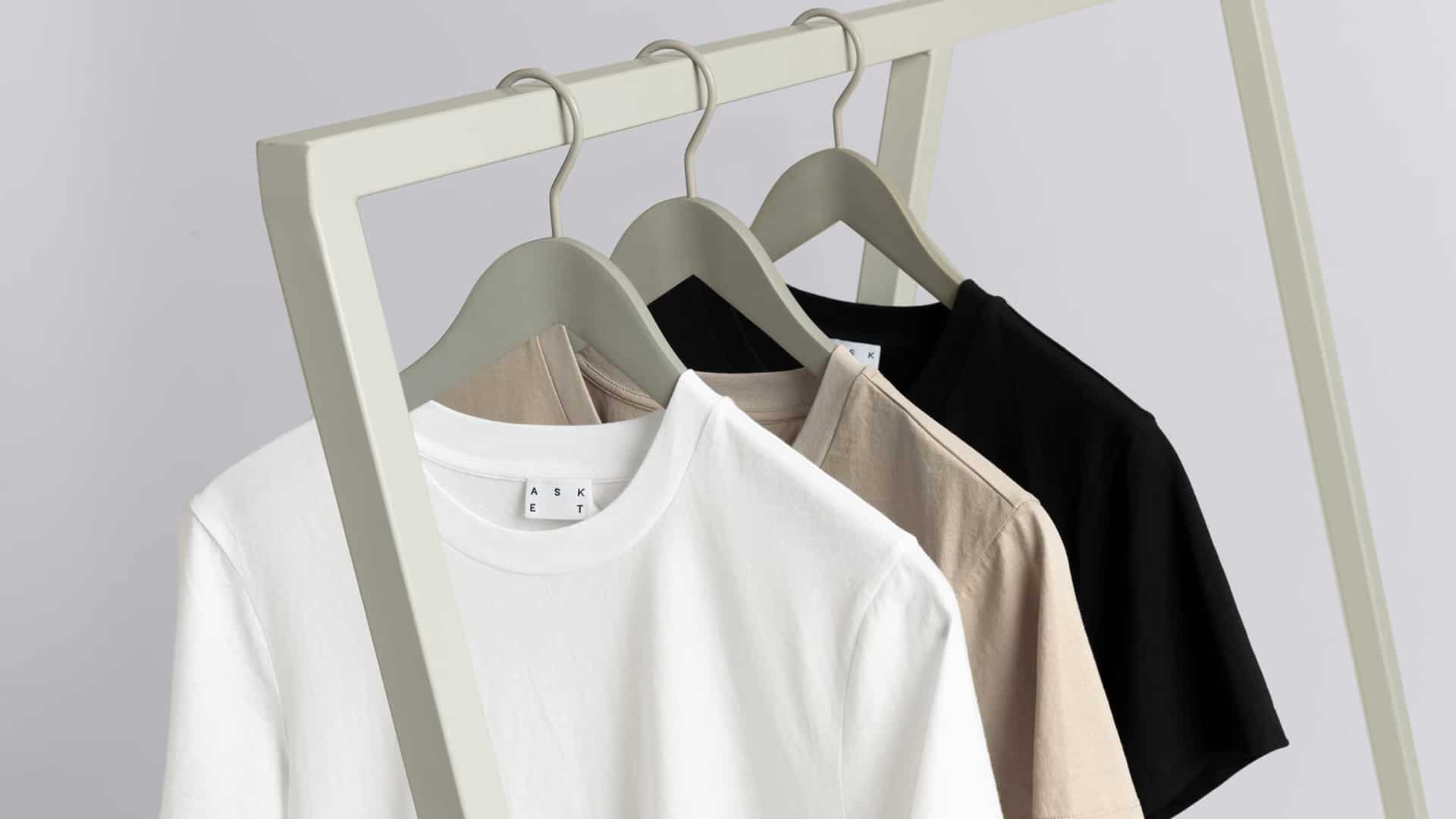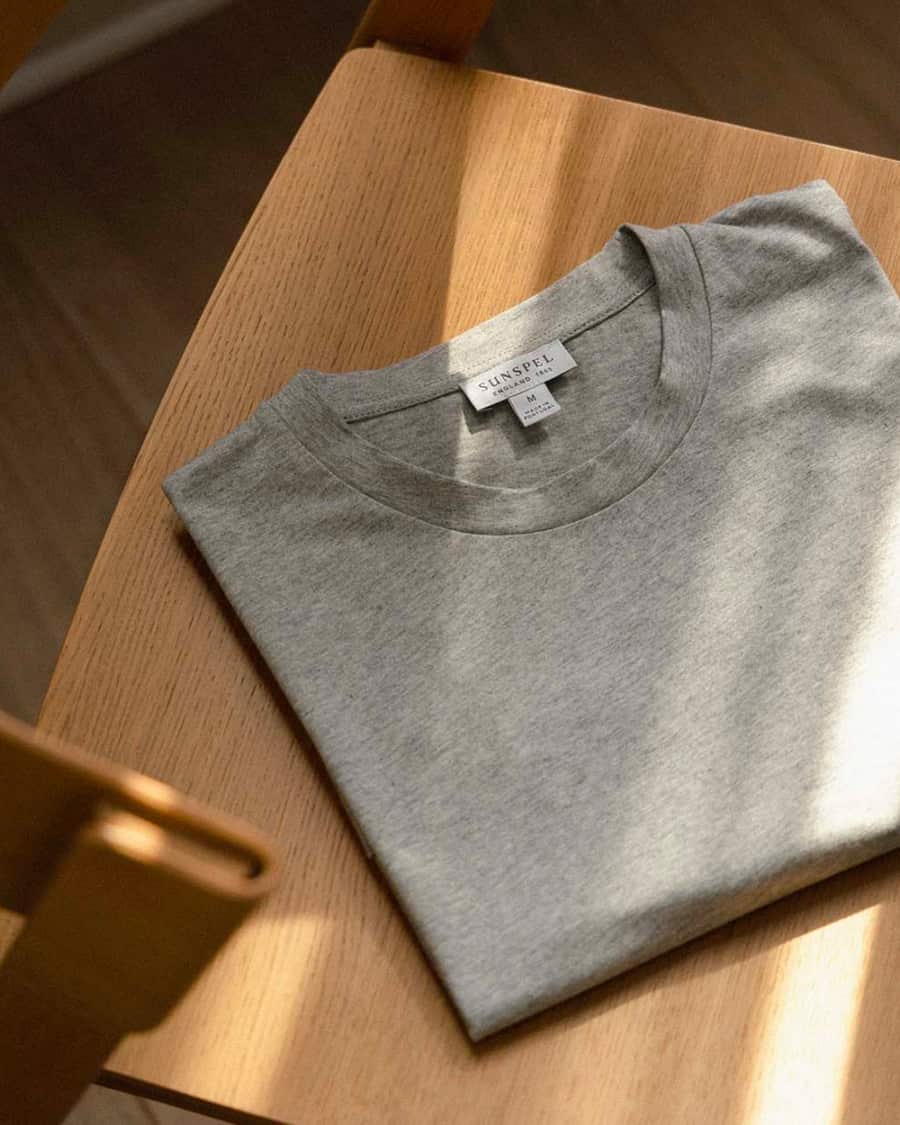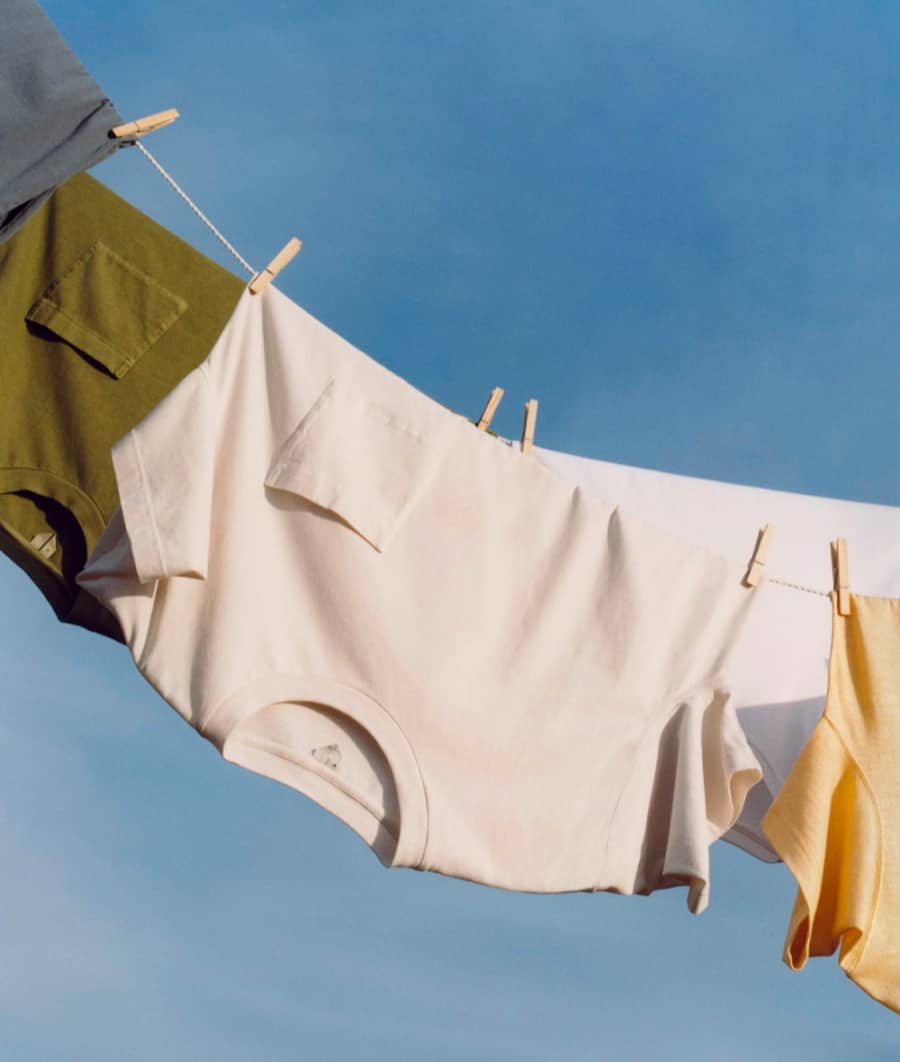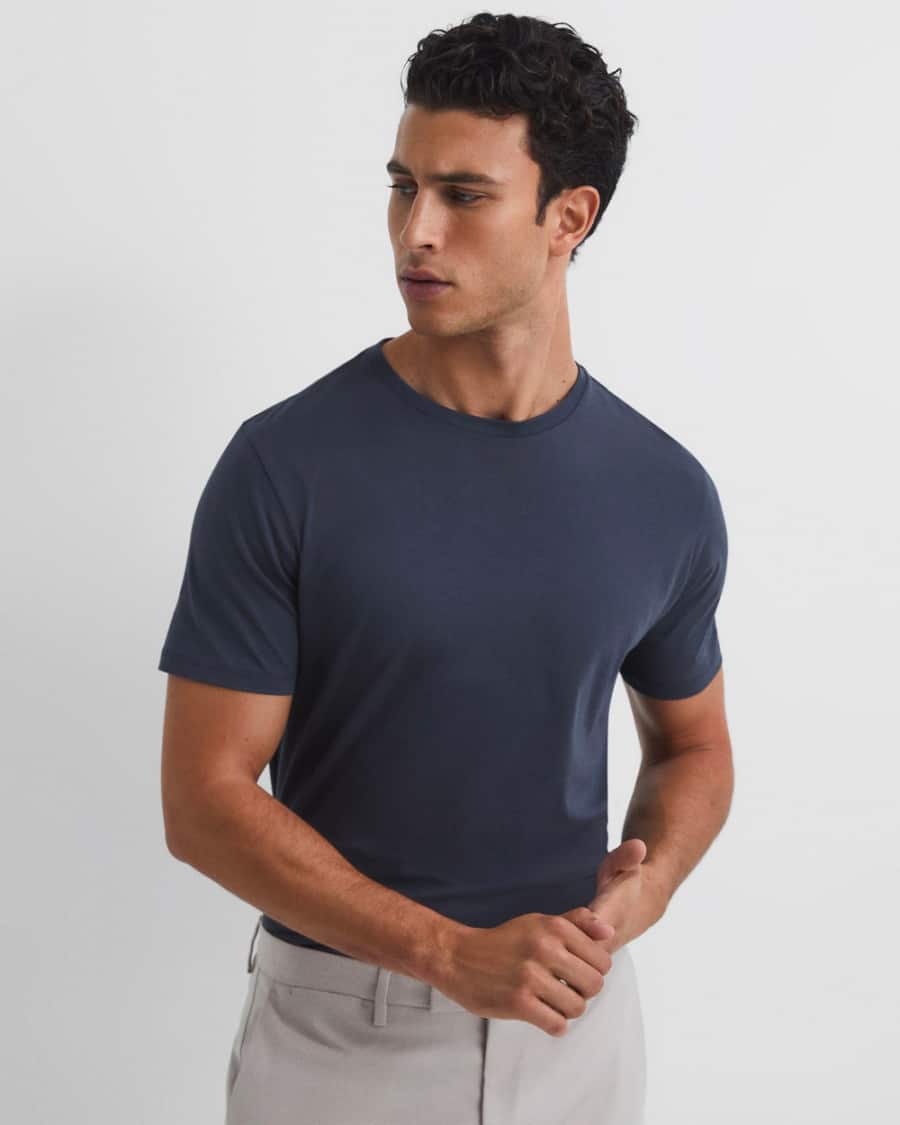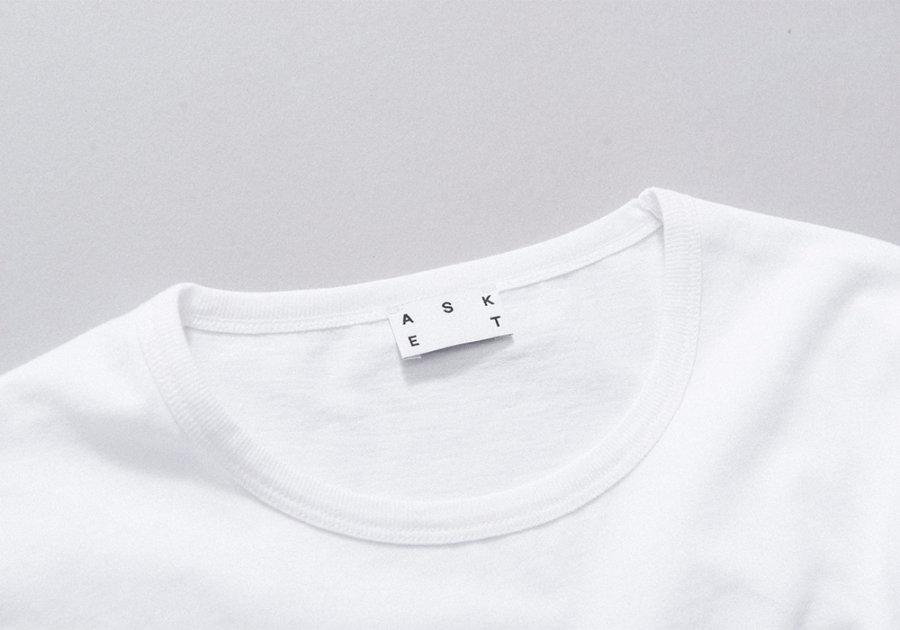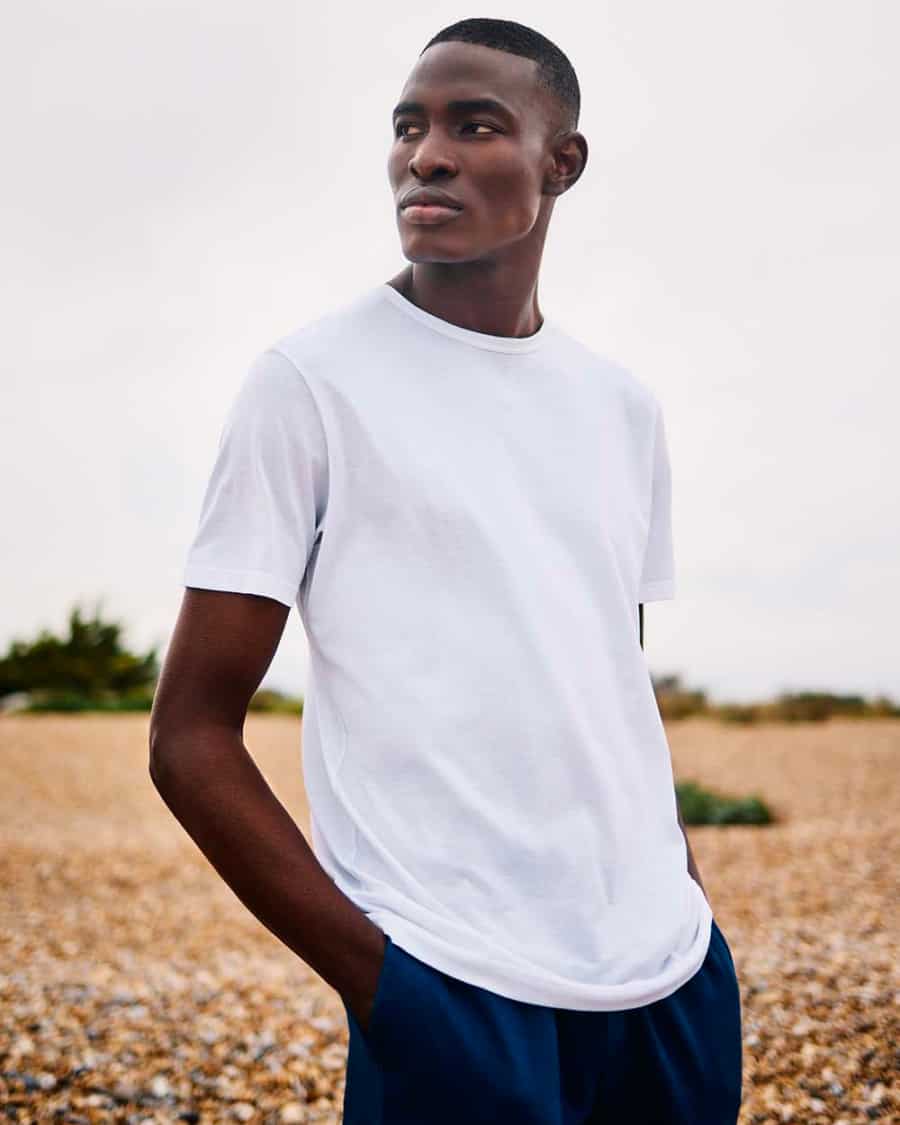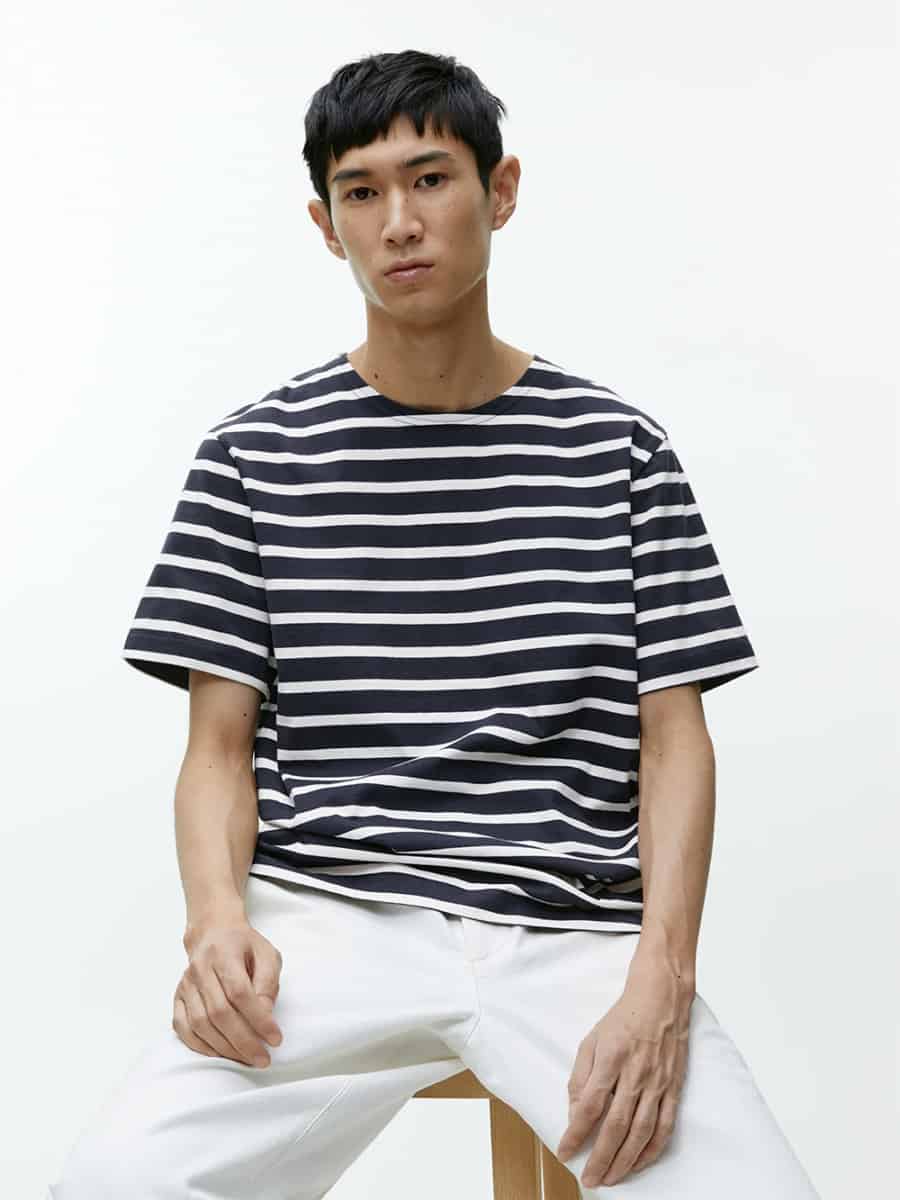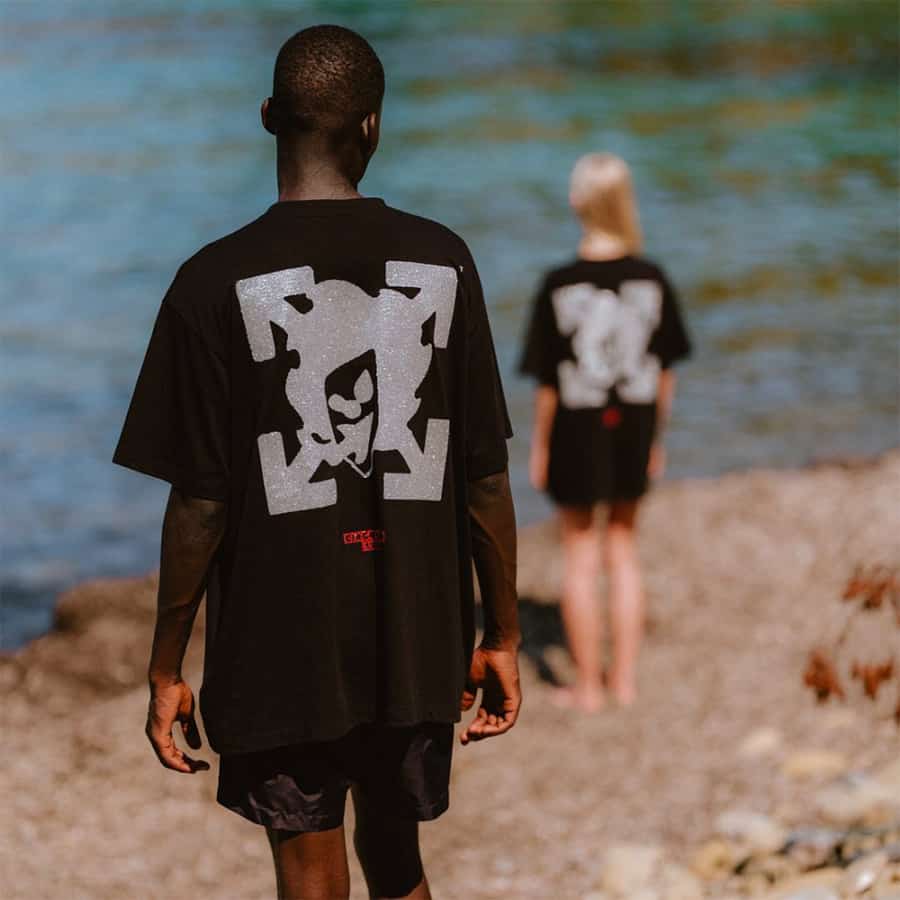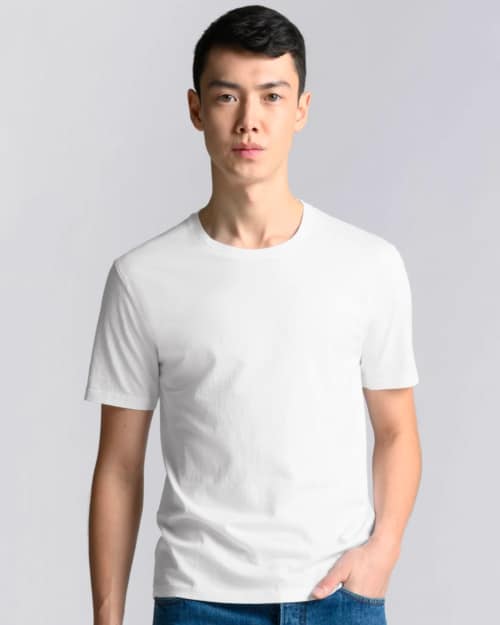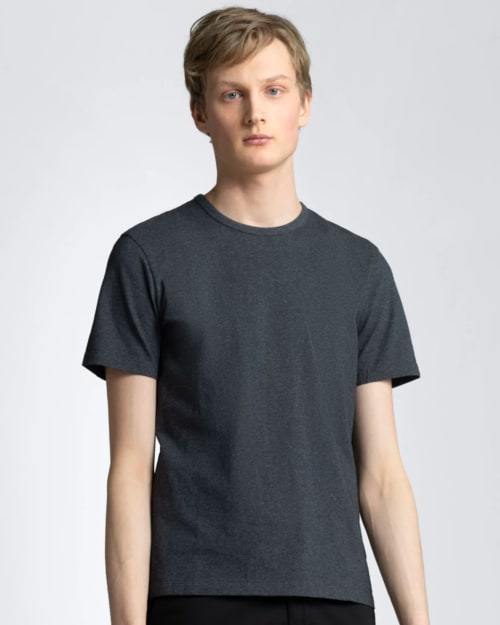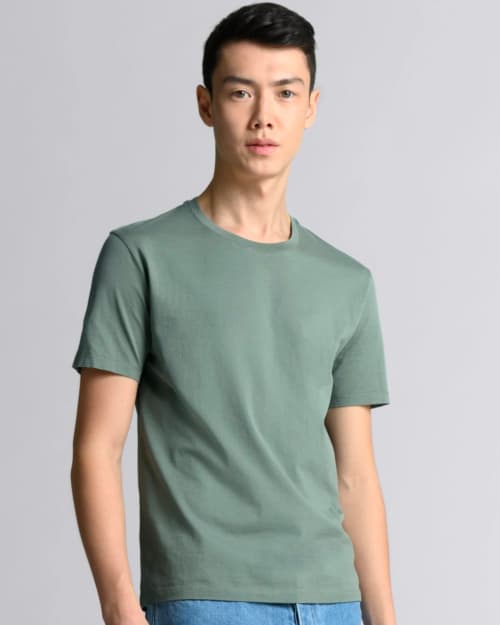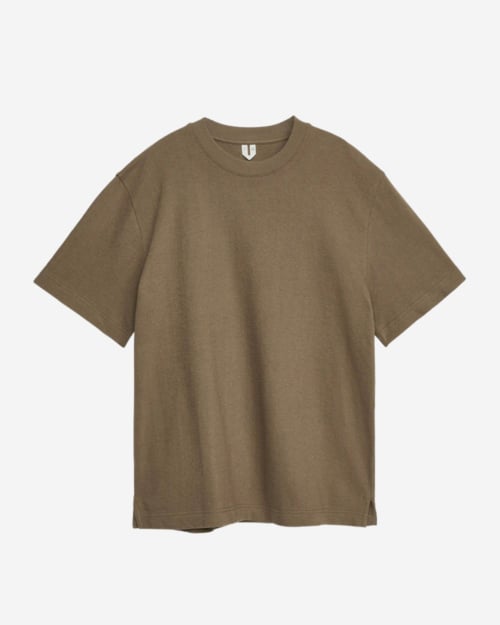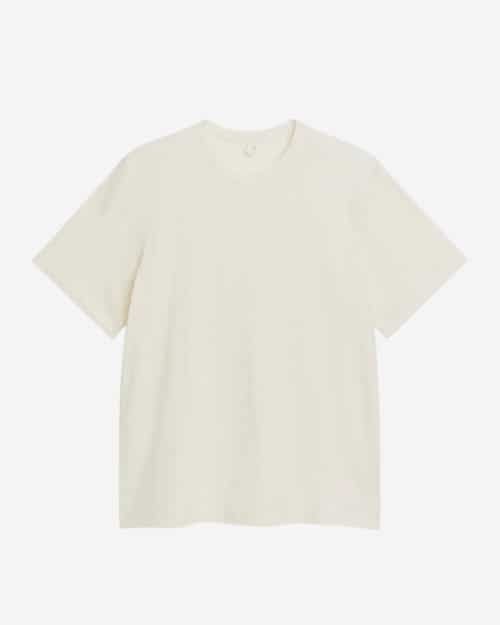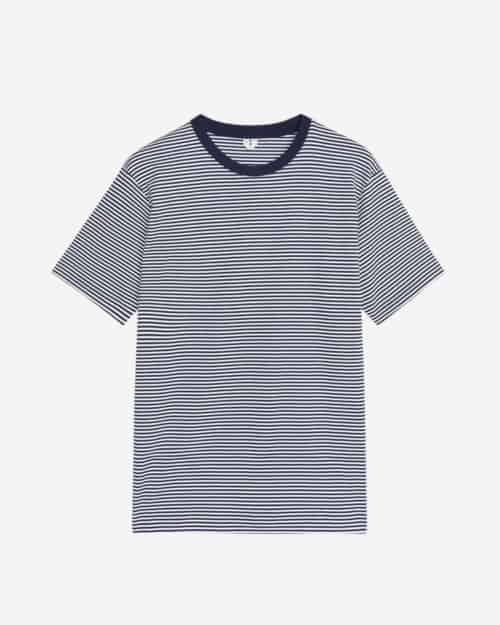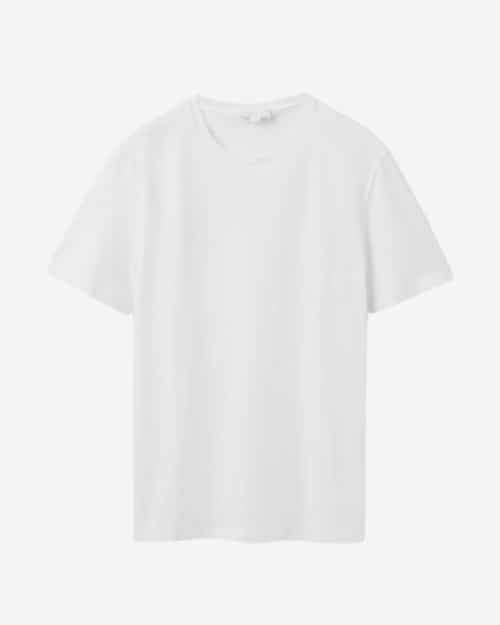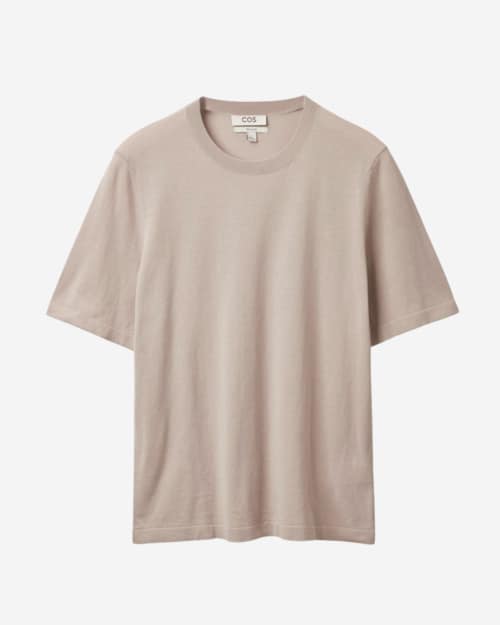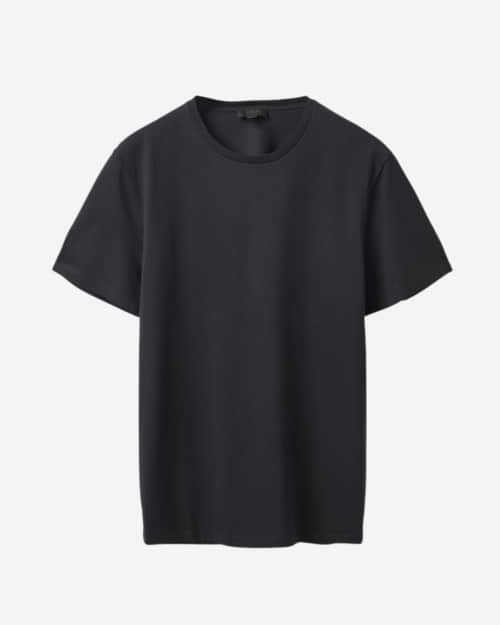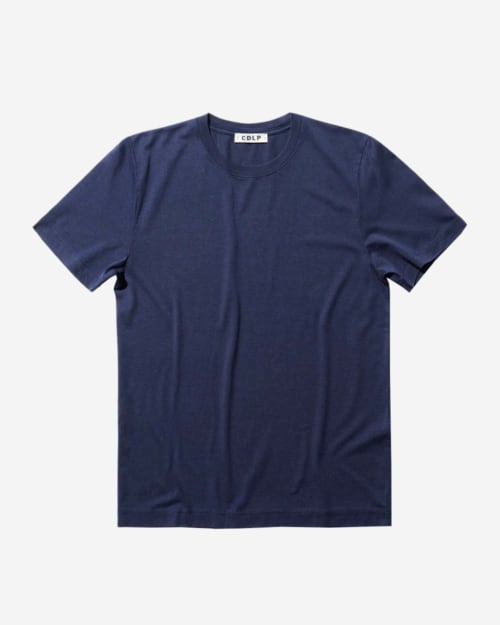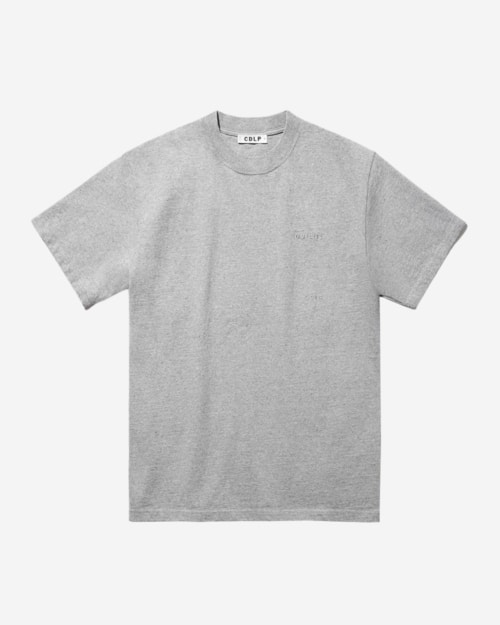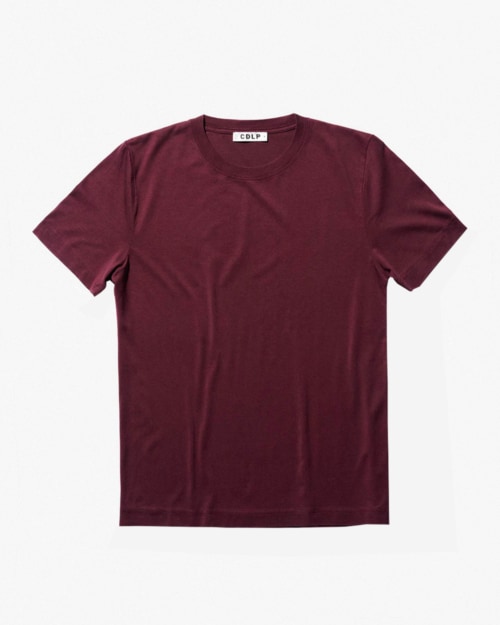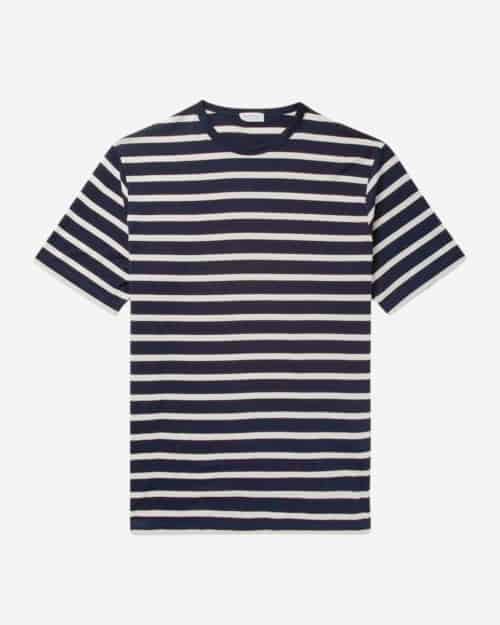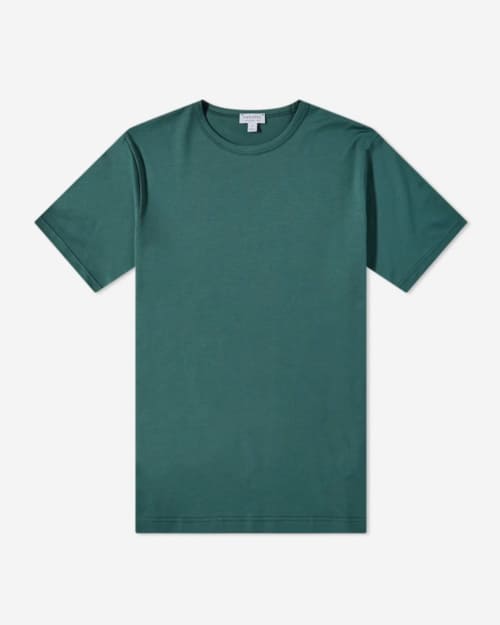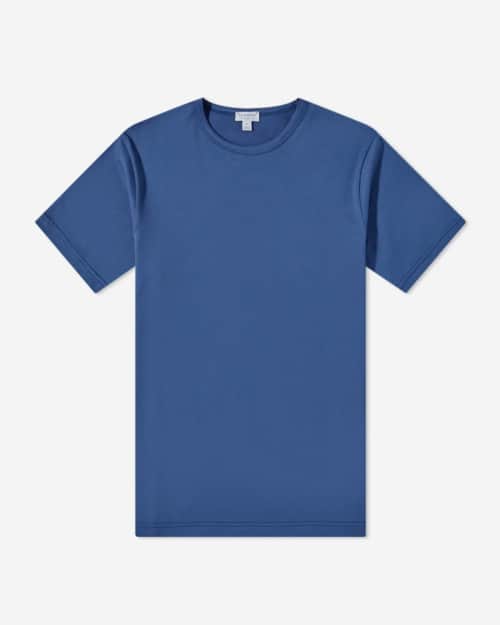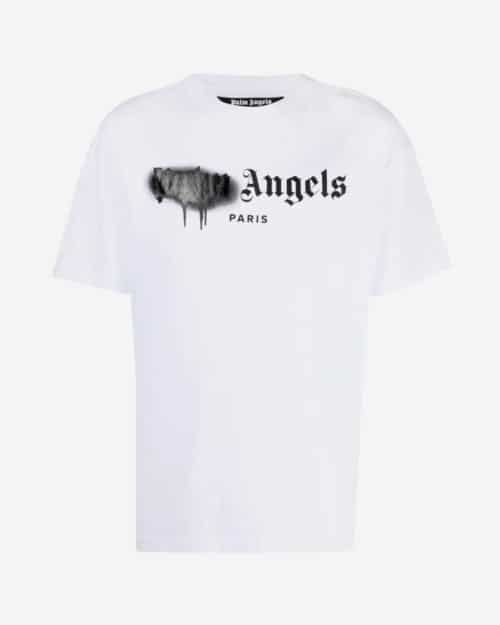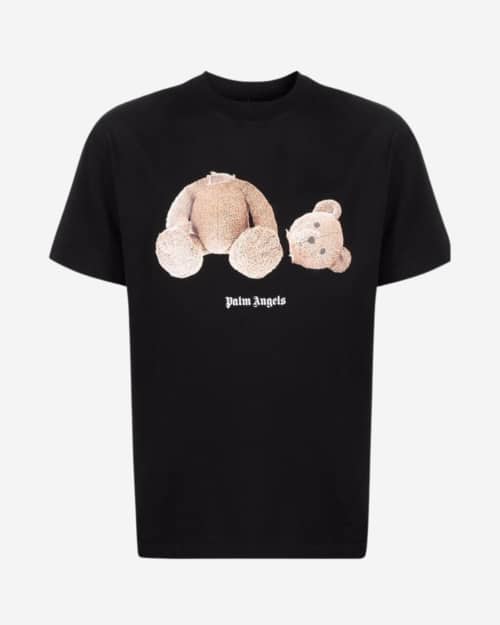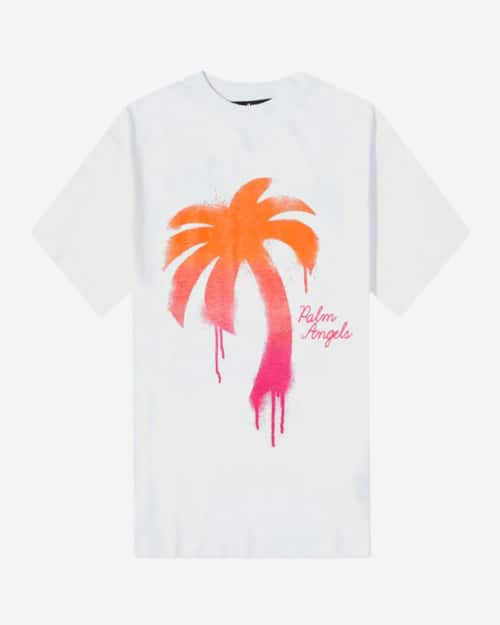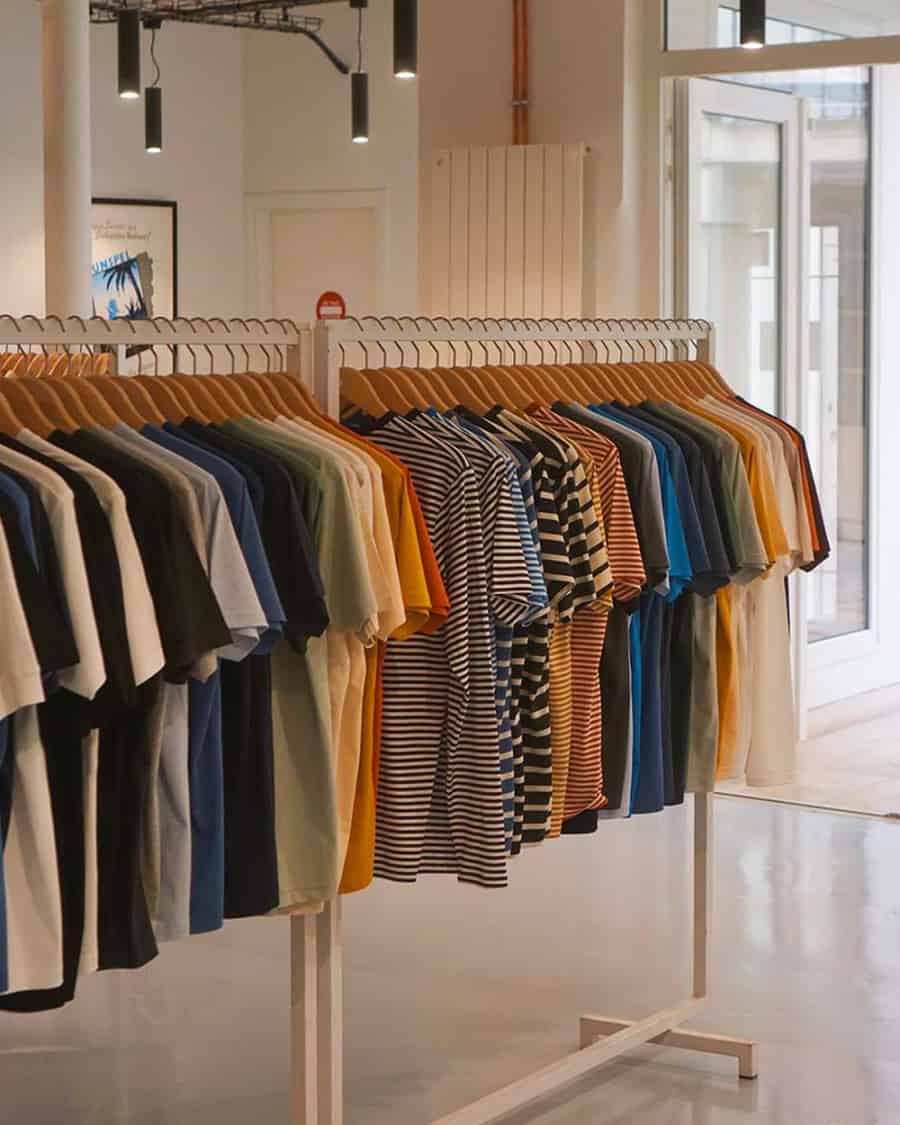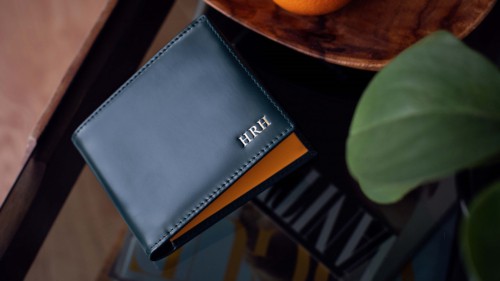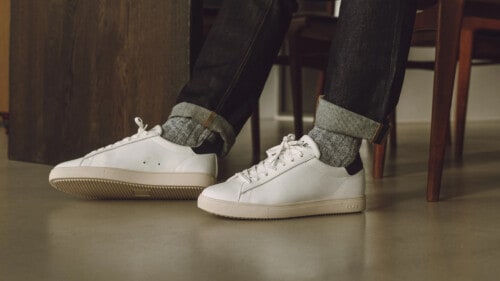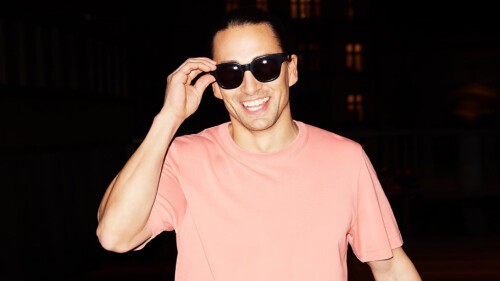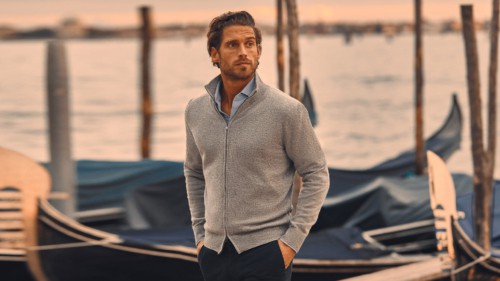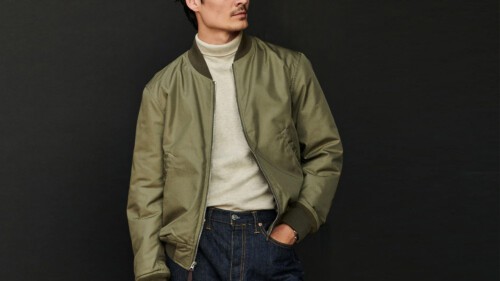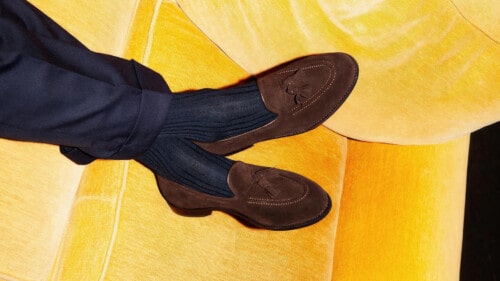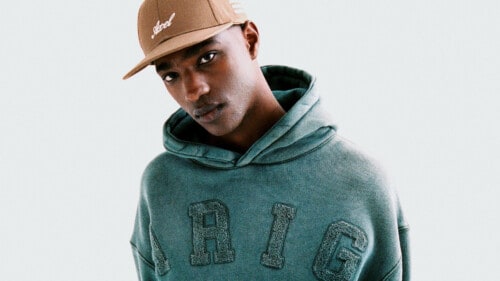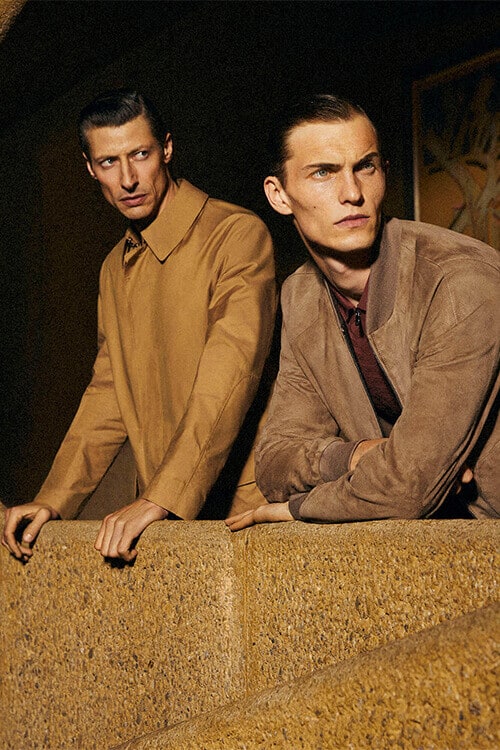The Ultimate Guide To Men’s T-Shirts
Quality always trumps quantity, especially when it comes to tees. Here's how to buy the best quality and most sustainable T-shirts from the most reputable makers.
Each and every year, over 2 billion T-shirts are sold around the world. That’s a lot of textiles, and consequently a lot of waste and water usage (a single white T-shirt requires the equivalent of around 10 bathtubs full of water). So we don’t write this T-shirt guide lightly. Nor do we want to stop you buying T-shirts, since they are an absolutely indispensable part of the male wardrobe and his psyche.
However, we all need to be more diligent about what we buy and who we buy it from, because that makes a big difference. Quality always trumps quantity, especially when it comes to tees, which is why this guide will teach you how to buy the best quality and most sustainable T-shirts from the most reputable makers. Do the environment a favour and skip the cheap multipacks in favour of superior tees that will last you multiple seasons, not multiple weeks.
What to look for in a T-shirt
T-shirt fabric
By and large, most T-shirts are constructed from cotton, but not all cotton is made equally and you should always try to seek out the best. Cotton jersey is knitted and thus the softest texture, which makes for a high-quality T-shirt. A lot of brands today focus on using sustainable organic cotton and recycled cotton in their jersey tees, both of which are better choices for the environment.
Another high-end option is Supima cotton, which has longer fibres than regular cotton, making it softer and more durable. Tees cut with a fitted shape will also typically have a polyester/polyamide component in them for stretch.
Cotton’s not the only game in town however. Linen is another excellent T-shirt fabric for the summer months, being lightweight and extremely sustainable (linen comes from flax crops which are naturally irrigated). It can have a ‘dry’ texture, which is why you’ll often find it blended with cotton for a softer yet silky finish.
Merino wool tees have become more popular in recent years as a luxury expression of the T-shirt, especially since people started wearing tees with tailoring. The super-soft, temperature-regulating properties of wool work like a dream when cut into a regular fit tee, providing a smooth handle and natural drape. Of course, this additional functionality comes at a cost, but take care of it and it’ll last you far longer than a cotton tee.
T-shirt weight
Fine cotton jersey – the type that feels light and smooth – will be between 145gsm and 180gsm (grams per square metre). Average T-shirt cloths usually come in around the 210gsm weight while heavyweight cotton jersey will be around 310gsm (a sweatshirt is typically around 340gsm).
All of this matters when considering the type of tee you’re after: for fitted styles, the finer the better, whereas if you prefer a boxier or even oversized cut, then a heavyweight cotton is going to drape and hold its shape better.
T-shirt cut/fit
As far as T-shirt shapes go, you will typically find the following cuts: fitted (body hugging), regular, boxy, and oversized.
Fitted styles come with a stretchy fabric (elastane/Lycra) woven into the cotton and suit those with a muscular physique. Regular styles are slim, but not overly so, cut to follow the contours of your torso without necessarily outlining them. Boxy tees are exactly that – cut in a boxier shape with wider sleeves than your regular tees – while oversized tees need no explaining.
Your body shape and your style preferences will determine your choices here.
T-shirt neckline
The crew-neck finish is the most common neckline and we’d say that 99% of the time it will be your best choice. Simple, clean and flattering, what’s not to like?
The V-neck alternative has a sportier vibe to it thanks to the sharp plunge into the upper chest, which can look good if you’re a monster on the bench press – otherwise, we’d say stick to crew neck.
There are other variations, such as a deep scallop neck, but less you know about those the better.
Tip: if the neckline is ribbed it will keep its shape better over time.
Key men’s T-shirt styles
Plain T-shirts
Clean. Classic. Undeniable. The plain T-shirt is unrivalled for versatility. There’s nothing this garment can’t do. Own a high-quality plain crew neck in black, white, grey and a sprinkling of brighter tones and you really can’t go wrong.
They look good paired with jeans and chinos for a fresh summer look either on their own or layered with an open shirt, or you can dress down tailoring with them for a relaxed sartorial aesthetic. And of course, it goes without saying that you can wear them in a sporty context too with hoodies, zip-throughs and such like.
Patterned T-shirts
Striped tees are a really effective way to introduce patterns into a look. One only has to look at the longevity of the Breton top to understand how cool they can be. Simple horizontal navy and white stripes are visually appealing and look smart to boot, while multi-coloured stripes bring a touch of summer to relaxed casualwear.
Fashion T-shirts
T-shirts make up a huge proportion of luxury fashion sales, being at a reasonably ‘affordable’ price point for people to invest in, so it’s no surprise that every major label produces a mass of logo-rich and creative options each season.
You can expect everything from minimalistic brand references to avant-garde designs and embellishments – ultimately your choice comes down to personal preference, brand loyalty, and whether publicly displaying your ‘fashion nous’ is worth shelling out for.
The best men’s T-shirt brands in 2024
Clean and simple T-shirt brands
Great value, minimal design, free from branding. These are the type of tees that form the backbone of any modern capsule wardrobe.
Asket
Asket is peerless when it comes to transparency and sustainability so you can be sure that your T-shirt has come from a good place. Constructed from 180gsm Egyptian cotton jersey, the regular tee is right up there with the best, while its lightweight version is cut from a custom ELS (Extra Long Staple) Egyptian cotton knit, made from the top 10% cotton branches in the world, and feels super silky.
Uniqlo
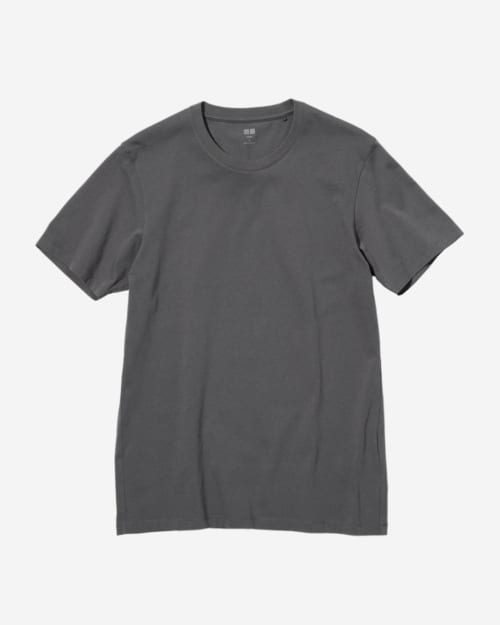
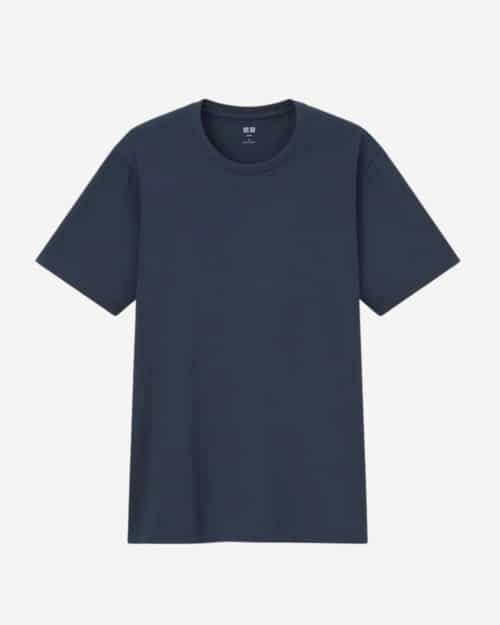
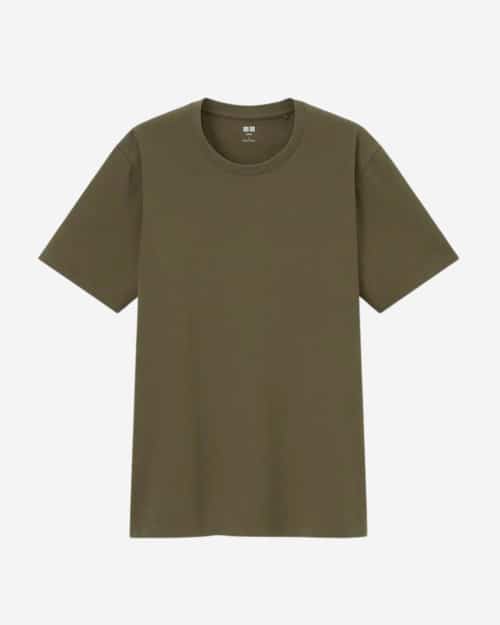
The go-to option for amazing value tees in a variety of cuts and fabric configurations. Uniqlo seems to have a T-shirt for all scenarios and body shapes so you really can’t go wrong. We’re really impressed with their Supima cotton styles which you can bag for under £15/$15. No brainer.
Reiss
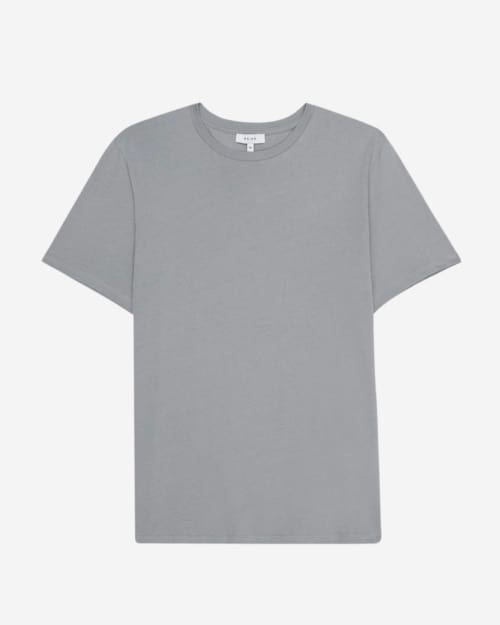
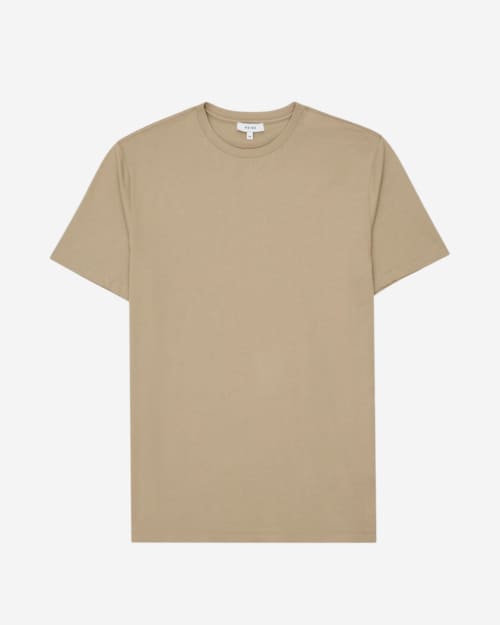
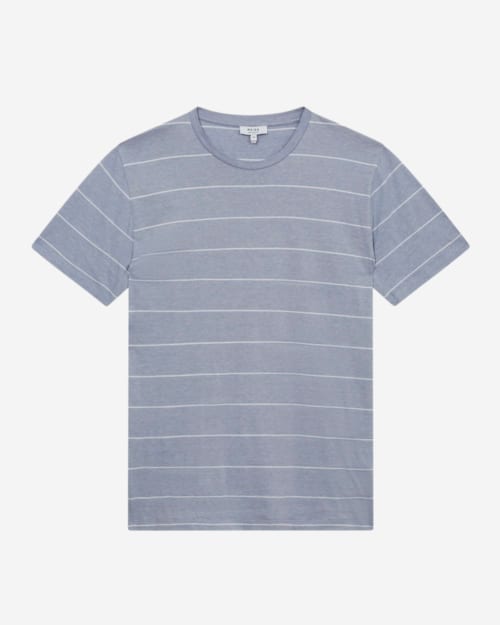
The high street’s smart option does a fine range of plain T-shirts that are smarter than your average. Offering slim fit, regular fit and oversized options, Reiss’ tees come in a range of muted tones perfect for wearing with casual tailoring and are well priced for the cut and quality.
Arket
Modern and sustainable menswear classics is what Scandi brand Arket do best so you can count on their tees being right on the money. They mostly stick to a regular fit, but vary the cotton weight options (170 gsm midweight and 220gsm heavyweight) in a selection of predictably understated tones.
They also offer a bouclé knit organic cotton that feels more like terry towelling, as well as a lightweight linen-blend style, all of which are excellent value.
COS
For less than a good bottle of wine, COS can sell you a midweight relaxed-fit white tee constructed from soft organic cotton. They make a nice oversized version with drop shoulders, too, as well as a brushed cotton style which is great if you want a little more texture in your tee.
With knitted styles, boxy fits and even tees made from hemp fibres, COS probably has the best all-round selection on the high street.
Luxury T-shirt brands
Introduce a touch of everyday luxury to your wardrobe with these high-end brands. Expect superior fabrics, meticulous craftsmanship and increased attention to detail.
CDLP
It’s a natural step that a Swedish underwear brand of the reputation of CDLP would go on to create a sublime T-shirt, and that is exactly what it has done.
CDLP goes with a relaxed-fit shape and, unlike the other brands on this list, has adopted a novel blend of pima cotton and lyocell – a natural fibre crafted from wood pulp derived from certified renewable sources. The benefit? Silk-like softness, great breathability and a really natural drape.
James Perse
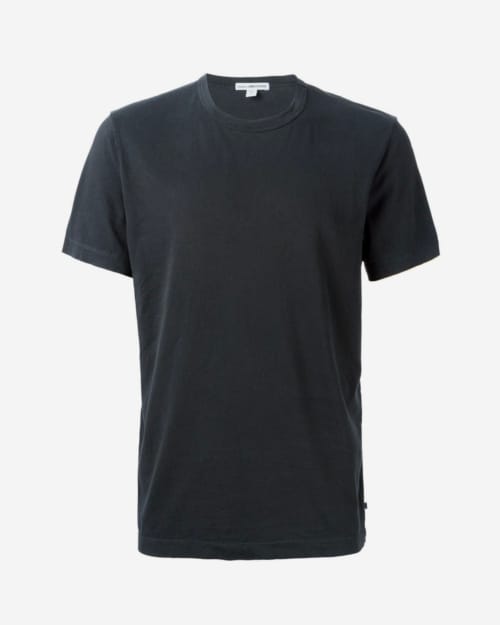
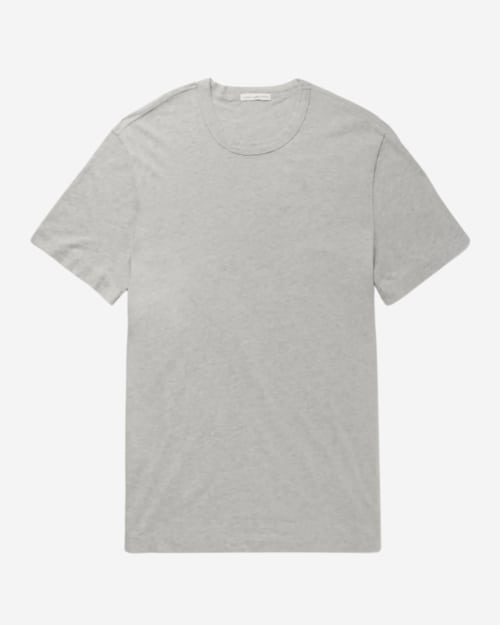
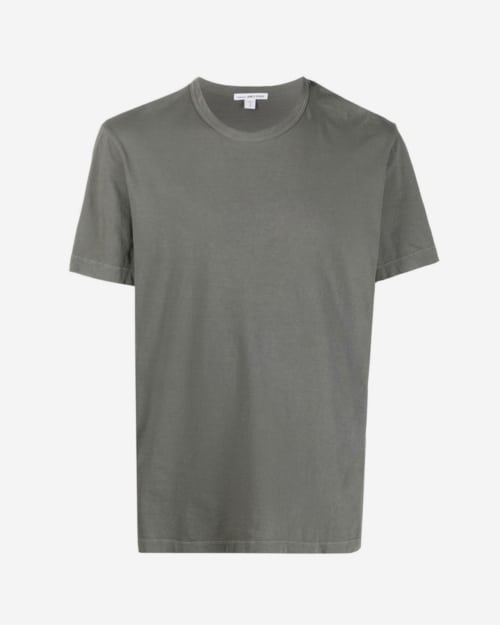
LA brand James Perse has made a name for itself producing luxury basics and high-quality essentials in an array of dark and muted tones. The house style is typically constructed from a lightweight cotton jersey and comes in a slim fit, but Perse also extensively uses what is called Lotus jersey, which is simply recycled cotton by another name.
Great for guys with a slim, honed physique (it’s an LA brand after all).
Loro Piana
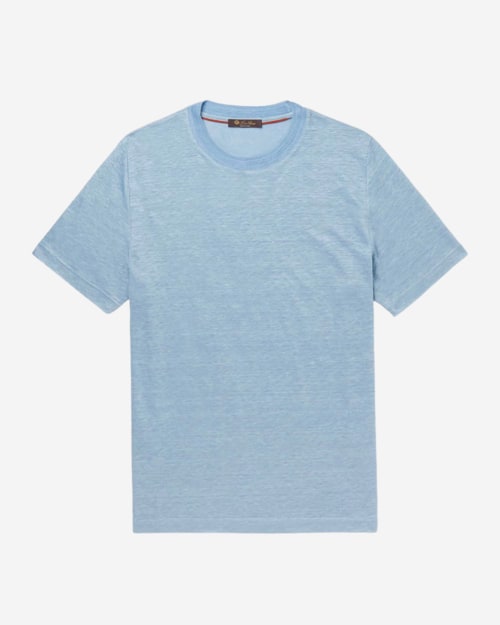
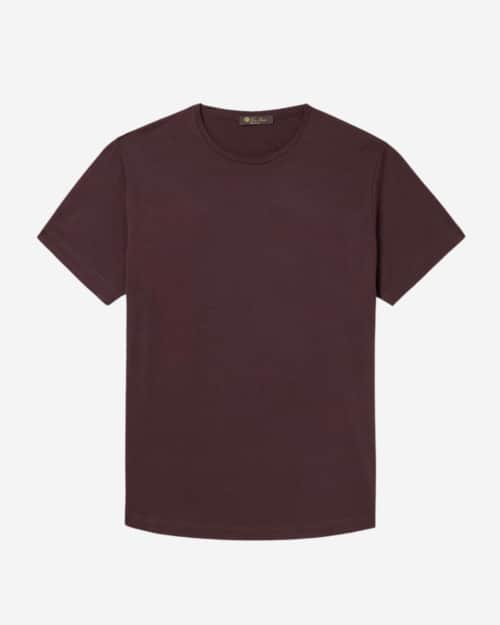
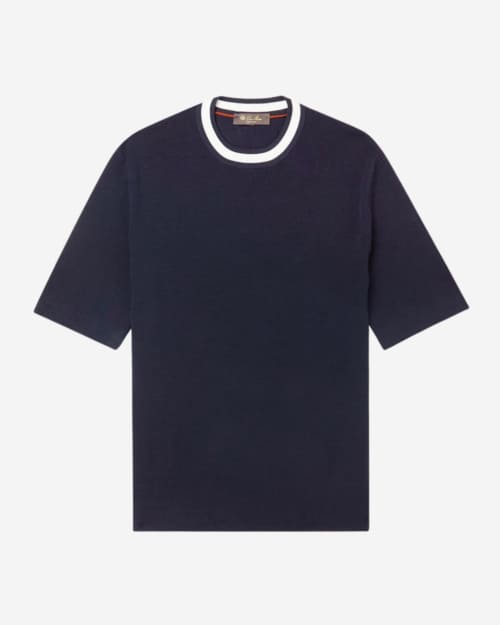
As you can imagine from an Italian brand revered for its fabric innovation and quality, Loro Piana’s T-shirts are hyper luxe and mostly constructed from a sumptuous blend of 60% cotton and 40% silk, making for a beautifully natural drape and an incredibly soft handle.
Naturally, these are not going to be your throw-on tees for nipping to the shops, but if you’ve got the funds then you’ll not find a better quality T-shirt anywhere else on the planet.
Sunspel
The British brand is widely recognised as producing some of the best-quality staples money can buy, so naturally its T-shirts would get a mention here. Its regular fit Classic tee comes in over 40 different colours and is crafted from a lightweight, ultra-fine, long staple Californian Supima cotton which provides extraordinary softness, comfort and lightness.
Fashion T-shirt brands
Looking for instant kudos from those in the know? These are the most sought-after logos on the planet right now.
Balenciaga
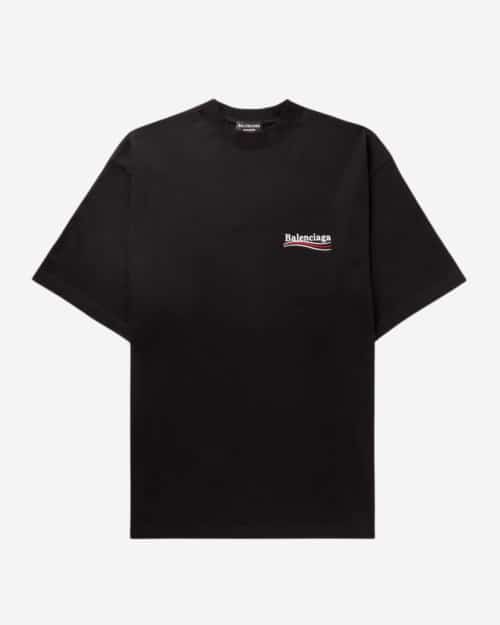
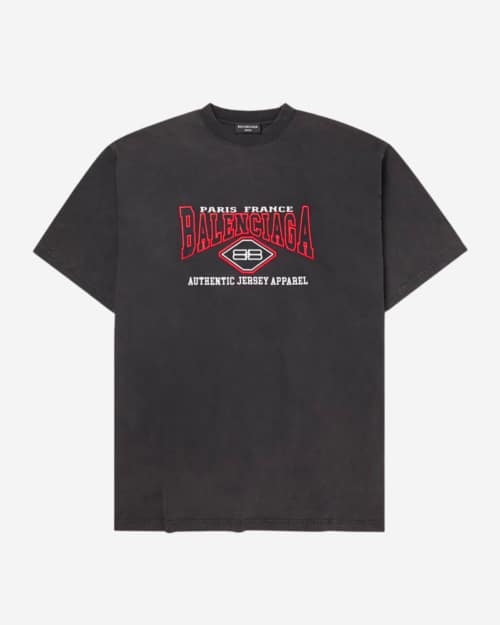
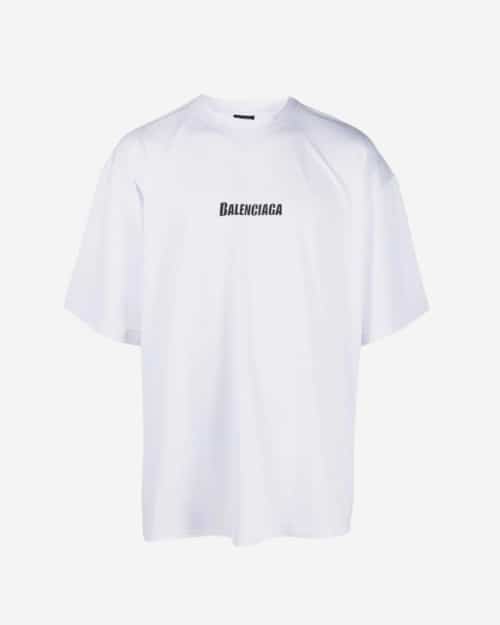
Under the creative direction of Demna Gvasalia, Balenciaga have become the hype luxury house of the moment, making its T-shirts hot property for brand hounds and trend heads. With subversive logo treatments and a decidedly black palette, its tees are ripe for wearing with edgy streetwear looks.
Off-White
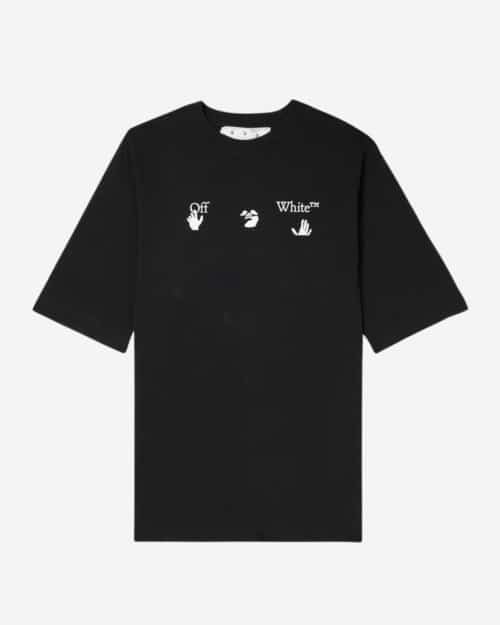
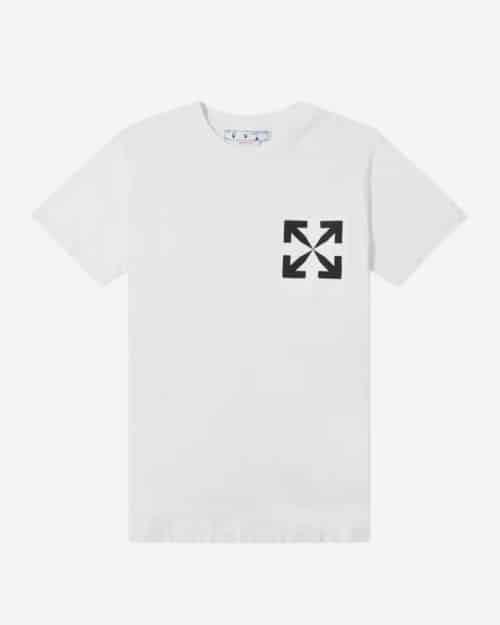
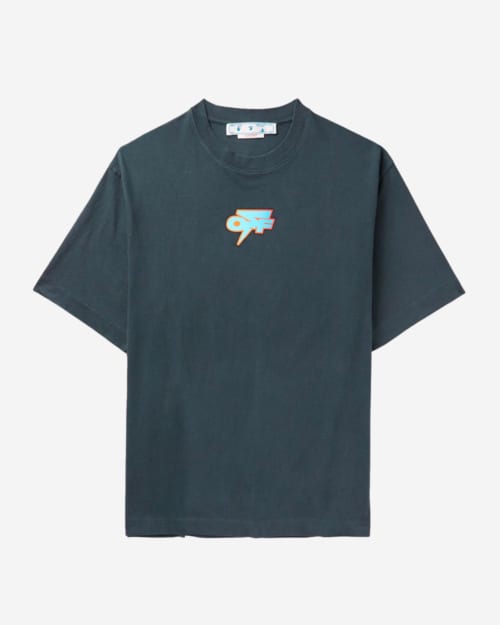
The late Virgil Abloh did amazing things with his label Off-White, turning relaxed streetwear silhouettes into must-have garments that changed the way we think about luxury fashion. He’s obviously left the brand in great hands because Off-White’s oversized tees are still as creative and sought-after as ever.
Acne Studios
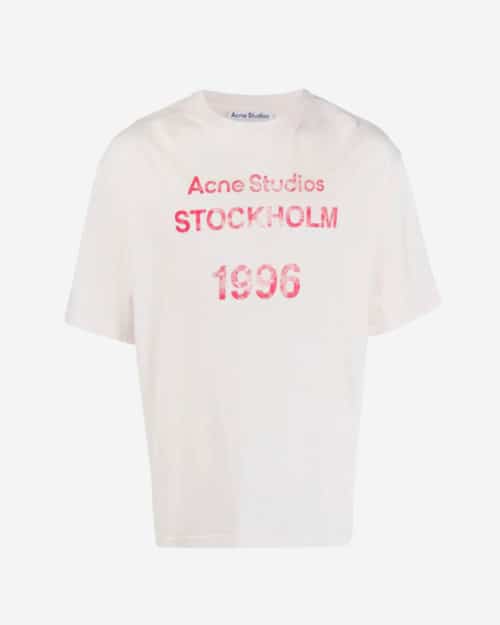
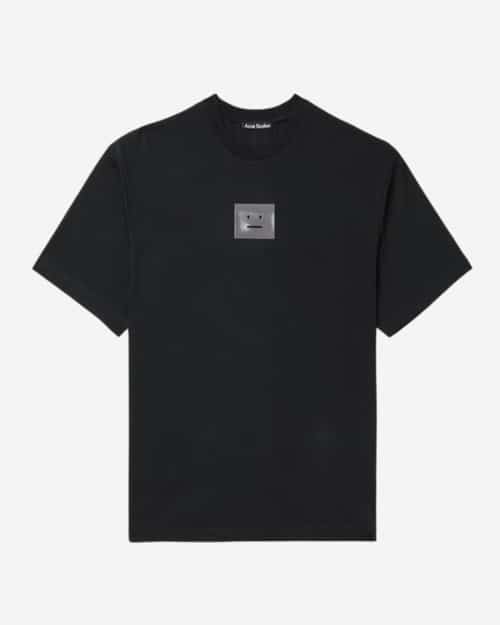
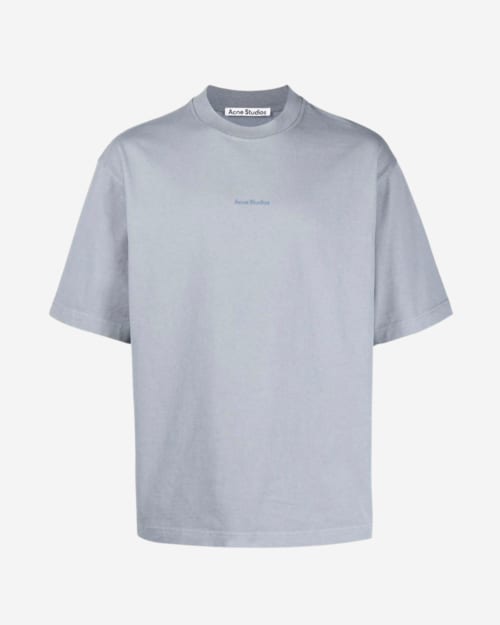
Swedish brand Acne Studios has long fostered a dedicated following thanks to its avant-garde approach to casual fashion. From plain crew necks crafted in organic cotton to subtle logo prints and leftfield graphic treatments, Acne’s tees have a skater vibe about them that makes for a bold and original fashion statement.
Palm Angels
Founded by Milan-born Francesco Ragazzi in 2011, Palm Angels produces some iconic T-shirts season after season, with its ‘broken bear’ graphic a huge hit.
The brand’s oversized skater-inspired tees have the best boxy silhouette that we’ve found anywhere, and when you couple this with cool and original graphic prints and logo treatments, you’ve got T-shirts that demand to be recognised.
The history of the T-shirt
It’s thought that the first examples of T-shirts, like many elements of modern menswear, were born out of necessity. Some time in the 19th century, in order to keep cool, labourers would resort to cutting their jumpsuits in half and at the sleeves. But it was between the Mexican-American War in 1898 and 1913 that the U.S. Navy began issuing soldiers with simple white cotton T-shirts to be worn as undergarments.
It wasn’t until 1920 that the humble tee got its first shout-out in popular culture, surfacing on a page of F. Scott Fitzgerald’s This Side of Paradise, but even then the T-shirt was not meant for public viewing; rather to remain beneath a shirt for comfort and warmth.
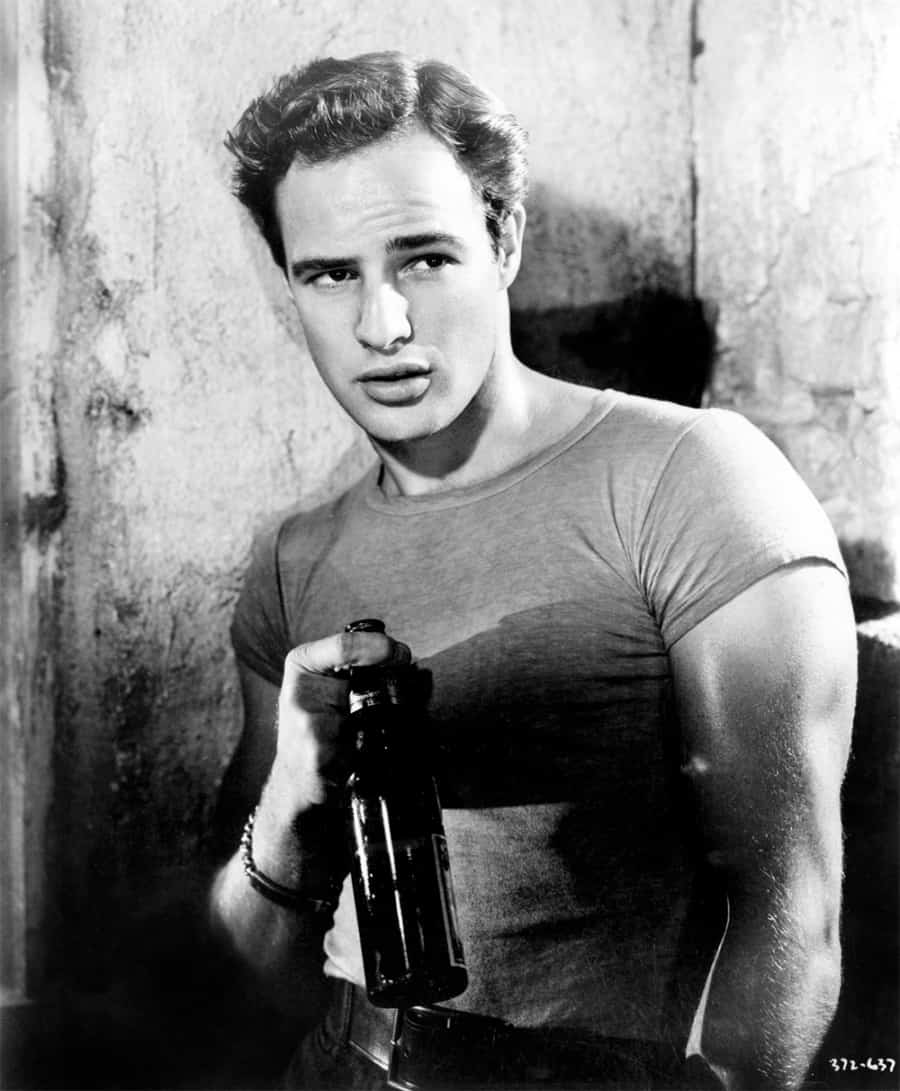
Marlon Brando wearing a T-shirt in A Streetcar Named Desire (1951)
That all changed on a dime in 1950 when Marlon Brando stepped out in a white T-shirt in A Streetcar Named Desire, followed by James Dean five years later in Rebel Without a Cause. Overnight, the T-shirt burst forth from the shadows and became a de facto symbol of countercultural rebellion and unapologetic masculinity. Wearing one for all to see was an act of personal expression and a political statement against the boring ways that the older generation had gone about dressing in the post-war years.
While the blank canvas of a plain T-shirt was a loud enough message in itself, printed slogan tees were like ideological megaphones on your chest. T-shirt printing took off in the 50s when Thomas E. Dewey, a Republican presidential candidate, created what was perhaps the first ever slogan design for his ‘Do it with Dewey’ campaign. The power of the ‘medium for the message’, as the New York Times eloquently put it, was not lost on a new generation of screen printers who realised that the T-shirt was more than a simple garment – it was a political, cultural and personal signifier that told everyone just whose camp, tribe party (and rock band) you were aligned with.
Today the T-shirt is everything to everyone. The simple styles worn by the likes of Brando and Dean all those years ago have been elevated with new cuts and better, more sustainable fabrics, while luxury brands have taken the concept of the logo tee and run with it, creating social status and taste signifiers out of the iconic silhouette.
